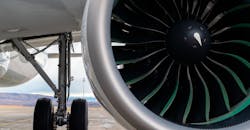FAA Orders Inspections of Pratt Turbofan Engines
The U.S. Federal Aviation Administration issued an air-worthiness directive requiring commercial operators of Pratt & Whitney PW1100G-JM and PW1400G-JM geared turbofan engines to conduct ultrasound inspection of the engines’ first-stage and second-stage hubs within 30 days. FAA has determined those structures may develop “micro cracks” that could result in disk failure, release of debris, engine damage, or damage to the aircraft.
"Material anomalies” – i.e., the microcracking – "could lead to premature fracture and uncontained failure, which indicates an immediate safety of flight problem," according to the FAA directive.
In a July statement, Pratt & Whitney identified the suspected parts as powdered-metal components installed in about 1,200 engines produced for Airbus A320neo jets between 2015 and 2021. In early August, Pratt instructed the engine operators to expedite the disk inspections.
The FAA indicated that 20 engines on jets operated by U.S. carriers and 202 engines on other airlines will require the ultrasound inspection.
The agency reported that the problem was discovered in December 2022 when an Airbus A320neo had an aborted take-off as a result a high-pressure compressor blade separated from the rotor.
